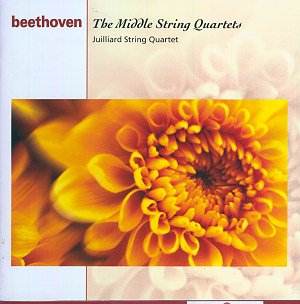It’s necessary to note, once again, that Sony Essential Classics
dispense with the minority interest of location and date of recording.
It may not worry prospective purchasers that this handy triple album
box was recorded nearly twenty years ago and in front of a live audience
– at least I presume this is a repackaging of that 1983 live traversal
of the Middle Quartets – but it might have been nice of Sony to have
given them the opportunity to detect these essential facts from the
packaging. Or – perish the thought – could it be that Sony think these
things might put people off?
The Juilliard Quartet took over a period of being the
house quartet – artists-in-residence – at The Library of Congress in
1962, an honour passed on by the Budapest Quartet who had been there
in the same capacity since 1940. Over twenty years later the Juilliard
had lost little of their emblematic intelligence and tonal balance.
The Middle period quartets are more than recommendable and if not uniformly
successful they are always beautifully phrased without either exaggeration
or ostentation. There is clarity but equally a broad lyrical expansiveness,
which never cloys, in the opening movement of Op 59 No1, which I find
very sympathetic. They are good at the whimsical changes of mood in
the succeeding Allegretto and whilst they are quite slow in the adagio
there is always with the Juilliard commensurate rhythmic momentum and
eloquence. Maybe the concluding Allegro is somewhat forced – the passagework
is deliberate, the tempo sounds deliberately obstructed and the result
is that the movement sounds unduly ponderous. The first movement recapitulation
in Op 59 No 2 distends the movement to a remarkable 13’35 and it seems
longer. The second movement, the glorious molto Adagio, opens well but
is then subjected to some poor articulation and, once more, ponderousness
sets in, despite the objectively adequate timing – 13.01. Though not
explicitly too slow shapelessness makes it seem so and the arbitrary
sounding accelerandos add a cool and manicured quality to the music
making. Whilst the finale is good at locating the bristling naughtiness
in the writing it’s too little to salvage a performance that strives
hard but accomplishes little.
Elegance but sprightliness animates the Andante con
moto quasi allegretto of Op 59 No 3. This is a much better performance
than its earlier Opus mate, No 2, and shows their structural control
of material at quite a sedate tempo. How well they understand the elegant
antiquarianism of the third movement minuet - their predecessors at
The Library of Congress, for example, The Budapest Quartet, routinely
made the most almighty hash of it whenever they played it. Samuel Rhodes,
the splendid violist of the group, shines in the finale, its perpetual
motion and fugal episodes marvellously delineated – there is no loss
of articulation at a relatively sprightly tempo. They bring to the Quartets
Opp 74 and 95 great structural acuity and control. Their tempi sound
assured and yet pliant. The depth and sense of spaciousness in, for
example, the slow movement of Op 74 is the result of a commanding sense
of uniform line; the charm and clarity of the concluding Allegretto
the product of instrumental sophistication and musical understanding.
Strong and admiring applause greets the end of the
quartets; some coughing can be heard but it is mercifully almost entirely
absent and for the most part you won’t notice that these are live performances.
Not without problematical moments – obviously I didn’t care at all for
Op 59 No 2 – these are still challenging and worthy performances. If
my instincts incline me at moments more to their American colleagues,
the Fine Arts Quartet, that’s not to underestimate the more famous quartet;
the Juilliard still have plenty of sane things to say in this repertoire.
Jonathan Woolf


